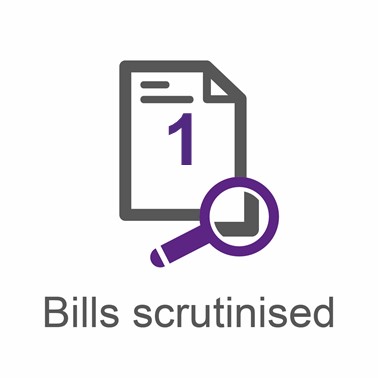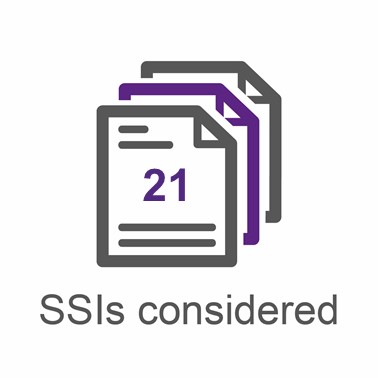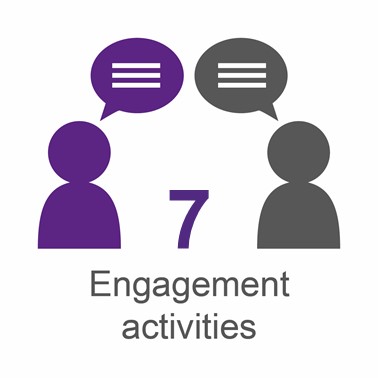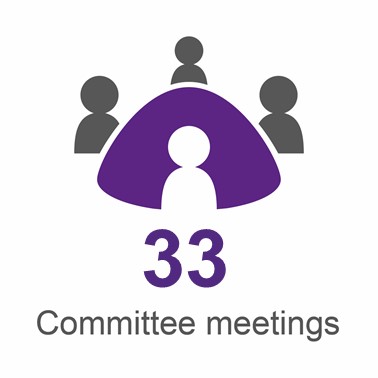Health, Social Care and Sport Committee
Annual Report of the Health, Social Care and Sport Committee for 2021-22
Introduction
This annual report covers the period of 13 May 2021 to 12 May 2022.
The remit of the Committee is to consider and report on matters falling under the responsibilities of the Cabinet Secretary for Health and Social Care, Humza Yousaf MSP, the Minister for Mental Wellbeing and Social Care, Kevin Stewart MSP, and the Minister for Public Health, Women's Health and Sport, Maree Todd MSP.
Perinatal mental health
During this short inquiry, the Committee was keen to explore the key issues around mental health facing new mothers during pregnancy and following the birth of a child that can impact on mental health. It considered aspects such as new mother care, breastfeeding support, specialist training, and the mental health impacts of bereavement from miscarriage and the death of an infant. It also considered the impact of COVID-19 on perinatal mental health and explored opportunities to improve and increase access to perinatal mental health services in Scotland.
The Committee issued a general call for views in November 2021 and received 104 responses. We then took evidence from a range of stakeholders, including families with lived experience, professional organisations and academics, voluntary sector support organisations, the Minister for Mental Wellbeing and Social Care, the Minister for Public Health, Women's Health and Sport and the Chair of the Perinatal and Infant Mental Health Programme Board.
Our report, Inquiry into perinatal mental health, was published on 8 February 2022. We received a joint response to the report on 28 March 2022 from the Minister for Mental Wellbeing and Social Care and the Minister for Public Health, Women's Health and Sport. The report was debated by the Parliament on 29 March 2022.
Health and wellbeing of children and young people
This inquiry explored key issues affecting the health and wellbeing of children and young people including:
Child poverty (including the Scottish Government's current child poverty delivery plan), inequality and adverse childhood experiences
Issues affecting care experienced young people;
Mental health, access to Child and Adolescent Mental Health Services and the importance of early intervention; and
Health and wellbeing in schools
The Committee issued a call for views in November 2021 and received 97 responses.
In early 2022, the Committee held the following evidence sessions:
Date Evidence Session 11 January 2022 general health and wellbeing
17 January 2022 informal evidence session with young people to discuss their experiences of health and wellbeing
18 January 2022 mental health and CAMHS
care experienced children and young people
25 January 2022 health and wellbeing in schools and education
1 February 2022 Minister for Public Health, Women's Health and Sport
Minister for Mental Wellbeing and Social Care
8 February 2022 Minister for Children and Young People
Cabinet Secretary for Social Justice, Housing and Local Government
Source: The Scottish Parliament
Our report, Inquiry Report: Health and Wellbeing of Children and Young People, was published on 13 May 2022.
Alternative pathways to primary care
For this inquiry, the Committee wanted to explore the different ways patients access primary healthcare services in Scotland. Primary care services provide the first point of contact in the healthcare system. When a person seeks healthcare their first point of contact is usually with a general practitioner. This inquiry focused on other sources of healthcare that exist in the community, which we term ‘alternative’ pathways. The inquiry also explored how alternative pathways are being accessed and used in primary care.
The Committee issued two separate call for views which ran from 19 December:
A public survey to ask people about their experience of using alternative pathways. The survey received 276 responses. A summary of the responses can be viewed here.
A more detailed call for views intended for professional organisations. The call for views received 74 responses from a variety of stakeholders and individuals.
The Committee held the following evidence sessions:
1 March 2022 Scottish Government (private session)
8 March 2022 Patient perspective
GP practices
15 March 2022 Other primary care providers
22 March 2022 Social prescribing
Online / telephone info / advice / online therapy
29 March 2022 Cabinet Secretary for Health and Social Care
Source: The Scottish Parliament
Our report, Inquiry into alternative pathways to primary care, is due to be published in June 2022.
Health inequalities
The Committee's predecessor conducted an inquiry into health inequalities and its report was published in January 2015. That Committee reported that health inequalities "would not be reduced without action to reduce inequalities in every other policy area and across every portfolio". On 26 March 2015, Conveners from across Scottish Parliament Committees joined together to debate the findings of that inquiry and agreed that cross-portfolio action was required.
The Committee was keen to sustain that collaborative approach and this inquiry was designed to explore cross-portfolio issues and action. This inquiry focused on exploring what progress has been made in Scotland in tackling health inequalities since 2015, examining the impact of the pandemic on health inequalities, making recommendations for Scottish Government and other key decision-makers, and making recommendations to ensure that the Scottish Parliament sustains a focus on health inequalities across all portfolios.
The Committee issued an initial call for views in February 2022 and received 113 responses.
The Committee will start taking oral evidence as part of its inquiry in May 2022.
Cross Committee working
In addition to planned cross-portfolio work as part of its inquiry into health inequalities, the Committee has undertaken two pieces of cross-Committee work.
Reducing drug deaths in Scotland and tackling problem drug use
On 1 February 2022 and 2 February 2022, Members of the Criminal Justice, Health, Social Care and Sport, and Social Justice and Social Security committees held joint evidence sessions to consider the progress made on the implementation of the recommendations of the Scottish Drug Deaths Taskforce.
The Committees took evidence from:
Date Evidence Session 1 February 2022 The Right Hon Kit Malthouse MP, Minister of State for Crime, Policing and Probation, UK Government
Marcus Starling, Head of the Drugs Misuse and Firearms Unit, Home Office, UK Government
2 February 2022 Angela Constance MSP, Minister for Drugs Policy, Scottish Government
Source: The Scottish Parliament
A joint call for views was issued seeking views on the actions that have been taken to implement the Taskforce's recommendations and the impact they have had. The call for views closed on 13 May 2022. Responses will be published in due course by the Criminal Justice Committee.
National Planning Framework 4
The Scottish Government laid The Draft Fourth National Planning Framework (Draft NPF4) in the Scottish Parliament on 10 November 2021. The Local Government, Housing and Planning Committee led the Scottish Parliament's consideration of the framework.
The Health, Social Care and Sport Committee was one of a number of Scottish Parliament Committees undertaking scrutiny of the framework. Our scrutiny focused on the impact of the proposed framework on health and wellbeing. The Committee heard evidence from the following on 25 January 2022:
Irene Beautyman, Place and Wellbeing Partnership Lead, Improvement Service
Dr Matt Lowther, Head of Communities and Local Partners, Public Health Scotland
Professor Jamie Pearce, Professor of Health Geography, School of GeoSciences, University of Edinburgh
Following this session, the Committee wrote to the Local Government, Housing and Planning Committee to provide formal input to the Scottish Parliament's cross-committee scrutiny of the framework.
The Local Government, Housing and Planning Committee secured a Chamber Debate on the Draft NPF4 on 19 April 2022, which the Committee contributed to.
Pre-Budget Scrutiny 2022-23
In recent years, in line with the recommendations of the Budget Process Review Group report, Scottish Parliament committees have undertaken pre-budget scrutiny, in advance of the publication of the Scottish budget.
On 28 September 2021, the Committee took evidence on health and social care finance from the following:
Leigh Johnston, Senior Manager, Audit Scotland
Professor David Bell, Professor of Economics, University of Stirling and CO-PI Healthy Ageing in Scotland (HAGIS)
Siva Anandaciv, Chief Analyst, The King's Fund
David Walsh, Public Health Programme Manager, Glasgow Centre for Population Health
Subsequently, the Committee wrote to the Cabinet Secretary for Health and Social Care on 26 October 2021 highlighting a number of issues raised during this evidence session of relevance to the 2022-23 Budget process.
The Scottish Government published its 2022-23 Budget on 9 December 2021. The Cabinet Secretary for Health and Social Care responded to the Committee's budget scrutiny letter on 13 December.
The Cabinet Secretary and supporting officials attended the Committee's post-budget evidence session on 21 December 2021.
Bills

Transvaginal Mesh Removal (Cost Reimbursement) (Scotland) Bill
The Cabinet Secretary for Health and Social Care, Humza Yousaf MSP, introduced the Transvaginal Mesh Removal (Cost Reimbursement) (Scotland) Bill ("the Bill") on 23 June 2021.
The Bill seeks to give power to Scottish Ministers to reimburse individuals who have entered into private arrangements and have paid to have transvaginal mesh removed from their body.
Following the introduction of the Bill, the Committee issued a call for views which ran from 1 September 2021 to 13 October 2021. We received 15 responses. Individuals affected by transvaginal mesh in Scotland were also able to provide additional, confidential information to the Committee through the written call for views.
To allow those affected to be reimbursed with the minimum of delay, the Committee agreed to work to an expedited timetable for the passage of the Bill
To inform stage 1 scrutiny of the Bill the Committee held the following evidence sessions—
Date of Meeting Session 26 October 2021 We held an informal meeting with with individuals affected by transvaginal mesh in Scotland who had experience of travelling outwith Scotland for mesh removal surgery, to understand their views on the proposals in the Bill.We also held an evidence session with the Scottish Government Bill team. 2 November 2021 This session focused on the Complex Mesh National Surgical Service, the referral process for future mesh removal services outside NHS Scotland, as well as eligibility and the intended administration of the scheme. 2 November 2021 During this session the Committee took evidence from the Cabinet Secretary for Health and Social Care. Source: The Scottish Parliament
The Committee published its Stage 1 Report on the Bill on 16 November 2021. The Cabinet Secretary for Health and Social Care responded on 22 November 2021. The Stage 1 Debate took place in the Chamber on 24 November 2021.
The Committee carried out Stage 2 proceedings on Tuesday 14 December 2021.
The Bill ended Stage 3 on 25 January 2022, with Committee Members contributing to the final debate on the Bill.
Legislative Consent Memorandums
We considered two legislative consent memorandums this reporting year relating to the Professional Qualifications Bill and the Health and Care Bill.
Professional Qualifications Bill
The UK Government introduced the Professional Qualifications Bill in the House of Lords on 12 May 2021. The Economy and Fair Work Committee led the Scottish Parliament's consideration of a Legislative Consent Memorandum in relation to the Bill.
The legislation covers professions that are within the competence of the Scottish Parliament and the remit of the Health, Social Care and Sport Committee, including some health and social services staff. In advance of the appearance of the Cabinet Secretary for Finance and the Economy before the Economy and Fair Work Committee to answer questions on the Legislative Consent Memorandum on 29 September 2021, the Health, Social Care and Sport Committee wrote to the Economy and Fair Work Committee to register specific concerns about the Professional Qualifications Bill.
Health and Care Bill
The UK Government introduced the Health and Care Bill in the House of Commons on 6 July 2021. The Cabinet Secretary for Health and Social Care, Humza Yousaf MSP, lodged a Legislative Consent Memorandum on the Health and Care Bill on 31 August 2021, under Rule 9.B.3.1(a) of the Parliament's Standing Orders. That LCM withheld consent to the whole Bill, pending suitable amendments by the UK Government.
The LCM was considered by the Committee on 5 October 2021 . The Committee reserved its position on whether to recommend consent to the Health and Care Bill pending receipt of a further, supplementary memorandum from the Scottish Government. The Scottish Government lodged three supplementary LCMs on 9 December 2021 and 27 January 2022, following amendments made to the Bill by the UK Government. These LCMs were considered by the Committee on 8 February 2022. An additional supplementary LCM was lodged on 12 April 2022 and was considered by the Committee on 19 April 2022.
The Committee reported to Parliament on 9 February 2022 and 20 April 2022 expressing its agreement with the Scottish Government's recommendation that, with the exception of the clause relating to the advertising of less healthy food and drink, legislative consent with respect to the UK Health and Care Bill should be granted.
UK Common Frameworks
The UK and devolved governments agreed that common frameworks would be needed after the UK's exit from the EU to ensure that, in certain policy areas, there was no divergence between the nations of the UK where that would be undesirable.
During its membership of the EU, the UK and all its governments had been required to comply with EU law. This ensured that in many policy areas, including some that are devolved, a broadly consistent approach was developed across all four nations.
Following its exit from the EU on 31 January 2020, the UK entered a transition period which ended on 31 December 2020. Throughout the transition period all parts of the UK had to comply with EU law. The end of the transition period opens the possibility of policy divergence between the four nations of the UK.
Common frameworks have been developed to ensure that rules and regulations in certain policy areas remain consistent across the UK. The Committee's role is to scrutinise those common frameworks covering decision-making in policy areas falling within our remit.
In this reporting year, the Committee considered four provisional Common Frameworks—
Provisional Common Framework on Public Health Protection and Health Security
Provisional Common Framework on Organs, Tissues and Cells (apart from embryos and gametes)
Provisional Common Framework on Blood Safety and Quality
Provisional Common Framework on Food Compositional Standards & Labelling
Having concluded its scrutiny of these four provisional Common Frameworks, the Committee intends to write to Scottish Ministers with concluding recommendations in May 2022.
Provisional Common Framework on Public Health Protection and Health Security
The provisional Common Framework on on Public Health Protection and Health Security was created to ensure continued cooperation on serious cross-border threats to health within the UK following the end of the Transition Period and a robust UK-wide regime on public health protection and health security.
This Common Framework is underpinned by the Health Security (EU Exit) Regulations 2021 which repeal retained EU law on health and security which no longer operates effectively in the UK, and introduce a standalone regime which requires the four nations to coordinate surveillance, prevention and control of serious cross-border threats to health.
At its meeting on 23 March 2021, the Committee's predecessor took evidence on these regulations and agreed it was content with a Scottish Government proposal to give consent to the UK Government to legislate via these regulations
We received a letter from the Scottish Government on 2 November 2021 sharing the text of the provisional UK Common Framework on Public Health Protection and Health Security. The letter requested we provide our commentary on the provisional Framework.
To inform our consideration of the provisional Framework the Committee issued a call for written views. One response was received. The Committee held evidence sessions with Public Health Scotland on 21 December 2021 and the Cabinet Secretary for Health and Social Care on 18 January 2022.
Provisional Common Framework on Food Compositional Standards & Labelling - to be updated
The provisional Food Compositional Standards & Labelling (FCSL) Common Framework aims to maintain standards for clear and accurate food information between the UK Government, Scottish Government, Welsh Government and the Northern Ireland Executive. The framework proposals have been jointly developed by officials in the Department for Environment, Food and Rural Affairs (DEFRA) in England, the Food Standards Agency (FSA) in Wales and Northern Ireland, and by Food Standards Scotland (FSS) in Scotland.
The FCSL framework sets out EU directive-derived legislation and the processes that may be used to propose new legislation in the food compositional standards and labelling policy area. The framework sets out how the four governments propose to work together and manage divergence on FCSL policy. The framework sets out a process by which any government can suggest changes to the standards and how such a proposal will be collectively considered before one or more governments introduce a change.
The framework notes two decision-making principles that governments should give due consideration to:
That consumers have the right to clear and accurate food information, to make informed, healthy, and safe choices.
That compliant businesses should be supported to trade across the UK with minimal barriers.
We received a letter from the Scottish Government on 22 February 2022 sharing the Provisional Common Framework on Food Compositional Standards & Labelling for scrutiny.
To inform our consideration of the provisional Common Framework, the Committee issued a call for written views. Two responses were received. The Committee took evidence from the Minister for Public Health, Women's Health and Sport on 3 May 2022.
Provisional Common Frameworks on Blood Safety and Quality, and Organs, Tissues and Cells (apart from embryos and gametes)
The purpose of the Provisional Common Frameworks on Blood Safety and Quality, and on Organs, Tissues and Cells (apart from embryos and gametes) is to maintain a compatible minimum set of safety and quality standards between the UK Government, Scottish Government, Welsh Government and the Northern Ireland Executive to make it easier for blood components, organs and non-reproductive tissues and cells to continue to be shared across the UK.
We received a letter from the Scottish Government on 9 December 2021 sharing the outline agreement of these provisional common frameworks for scrutiny.
To inform our consideration of the provisional Frameworks the Committee issued a call for written views. No responses were received. The Committee took evidence from the Minister for Public Health, Women's Health and Sport on 1 February 2022.
Subordinate Legislation
During the course of the reporting year, we considered—
4 SSIs subject to the affirmative procedure; and
17 SSIs and SIs subject to the negative procedure.

UK Statutory Instruments - European Union (Withdrawal) Act 2018
In this reporting year the Committee considered one health related statutory notification. The notification requested the approval of the Scottish Parliament for the exercise of powers by UK Ministers under the European Union (Withdrawal) Act 2018:
The European Qualifications (Health and Social Care Professions) (Amendment etc.) (EU EXIT) Regulations 2022
Equalities, Engagement and Innovation

The Committee is committed to ensure all the Committee's work is as inclusive as possible and takes due account of people's lived experience.
The pandemic has prevented us from carrying out face to face engagement in this reporting year. However, the Committee has continued to involve people in our work remotely. We have used a variety of methods to gather information including online surveys and informal evidence sessions to help us hear from a wide variety of stakeholders.
To inform our inquiry into alternative pathways to primary care, the Committee issued a survey for members of the public to provide their views. This was publicised online through social media, through print media and cascaded through relevant stakeholder organisations. We also issued an indepth consultation for medical professionals and organisations as part of the same inquiry.
The Committee also used the Your Priorities engagement platform to receive ideas from young people about the key issues facing them in relation to health and wellbeing, to inform our inquiry into the health and wellbeing of children and young people.
We held informal engagement sessions to inform our scrutiny of the following inquiries and legislation:
Informal engagement sessions Date Inquiry/legislation Participants 26 October 2021 Transvaginal Mesh Removal (Cost Reimbursement) (Scotland) Bill An informal engagement session with individuals affected by transvaginal mesh in Scotland. Supported by the ALLIANCE. 6 December 2021 Inquiry into perinatal mental health An informal engagement session to hear directly from individuals who have experienced mental health issues during pregnancy or after their baby was born. Supported by Aberlour, Fife Gingerbread, Home Start Scotland and Mind Mosaic. 17 January 2022 Inquiry into the health and wellbeing of children and young people An informal engagement session with young people to discuss their experiences of health and wellbeing. Supported by Barnardo's, Who Cares? Scotland and Carers Trust Scotland. 7 March 2022 Inquiry into alternative pathways to primary care An informal engagement session to hear the patient perspective and the lived experience of people who access primary care services. Those attending were identified by the ALLIANCE and Spring Social Prescribing. Source: The Scottish Parliament
A further four informal engagement events have been planned in May 2022 as part of the Committee's inquiry into health inequalities.
Meetings

We held 33 meetings in this reporting year. Agenda items held in private were primarily to consider draft reports, approach papers and our work programme. One meeting was held entirely in private.
Due to the COVID-19 pandemic, our meetings were held in either a hybrid or entirely virtual format throughout the whole of this reporting year.